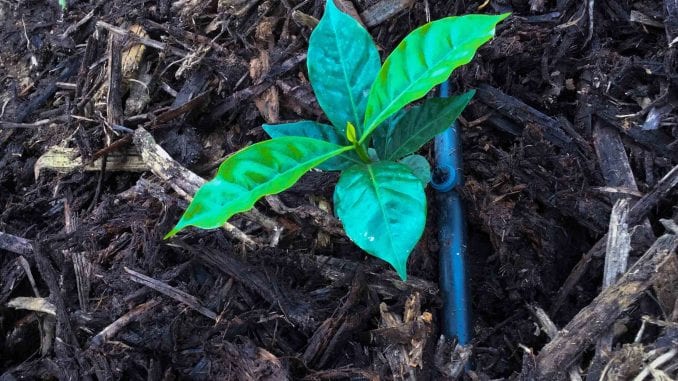
In an effort to bolster community development and financial security, “El Grupo de Mujeres” in Chaucha, Ecuador, mobilizes local producers
FROM STAFF REPORTS
Chaucha, Ecuador, a small coffee-growing village in the Andes Mountains, provides a clear example of a very particular crisis the coffee industry is now starting to face: youth migration from coffee-farming regions. According to a 2001 census, Chaucha had a population of 1,633. In 2010, the population had declined by 14%, and each year since then, men of working age have been migrating to the cities or to other countries to find work and better living conditions. Women and children now disproportionately populate Chaucha as husbands, fathers, brothers, and sons have left in search of more opportunity. While many experts have accurately acknowledged that the low price paid for coffee is a key factor in farmers leaving their land in search of more economically viable options, the inhabitants of Chaucha don’t view coffee as the problem. They see it as the opportunity, and a reason to stay.
In partnership with agronomists from Ecuador’s Ministry of Agriculture, a small group of 15 women called œEl Grupo de Mujeres, or, œThe Women’s Group, successfully mobilized 51 farmers from 10 villages in Chaucha to grow and harvest coffee collectively for sale. Their goal was to, through the creation of a coffee livelihood, create more jobs and business opportunity in their region so that more people would be encouraged to stay. The Ministry of Agriculture has agreed to support El Grupo de Mujeres in the establishment of several coffee nurseries, but they know they’ll need a lot more support, including technical training and processing equipment. Their goal is to construct 10 wet coffee processing facilities during the next three years before their first big harvest so that cherries from their villages are not subject to damage during transport. Later, they plan to construct a central distribution center, and will provide continual training in harvesting and processing to their members.

Nora Burkey, Executive Director of The Chain Collaborative (TCC), said œOur organization believes that everyone should have the opportunity to build the life they imagine. Everyone deserves the opportunity to work toward their dreams. These 15 women of Ecuador are dreaming big, so for us it was a no-brainer. We decided to launch a new partnership with El Grupo de Mujeres to invest in their dream, to support them as they live the life they imagine.
The initial conversation with El Grupo de Mujeres began over a year ago when Martha Camp, owner of Hacienda Santa Marta in Chaucha, reached out to Nora for support. œWhen Martha told us that she couldn’t get a response from anyone she had reached out to, we knew she was exactly the person we as an organization were founded to work with. TCC is not quite like other non-profits. They invest in local change leaders to create, implement, and sustain change in their own communities. They refer to these local leaders as œchange leaders, and truly believe in them to create their own change and future. When El Grupo de Mujeres first contacted TCC, they wanted help for a coffee project, but they didn’t know what kind project that was going to be. Nora said, œWe sent them a toolkit for how to build a proposal and said we don’t tell you what to do, you tell us. It took them almost a year to build a proposal based off the toolkit, but they came back to us with a fully designed project, and even some initial investment. That’s what we call community-driven development, and that’s where we want to put our investment.
TCC has agreed to support El Grupo de Mujeres to build 5 coffee processing stations in 5 small towns. With these facilities, farmers will be able to increase their income from the coffee they tirelessly tend and grow daily. They will be able to invest in their families for generations to come, support their children through school, access medical care for their communities, and lead thriving lives in their villages. Regarding the organization’s mission, Nora said, œWe believe that when we invest in communities, great coffee will follow. We think that’s the definition of great coffee. For us, it’s not about the kind of coffee we want to buy. It’s about who we want to sell it.
To launch its partnership with the women which will see the building of 5 wet mills, The Chain Collaborative needs your help! Visit this link: https://www.classy.org/ ¦/invest-in-local-leaders-spa ¦/c89758to invest in the women of Chaucha and show your support!
Below are 3 of the women who will be selling their coffee through this project:





Thanks for your comment, Madison! Please visit our fundraising page to take action! https://www.classy.org/campaign/invest-in-local-leaders-spark-change/c89758
Wow, what amazing, strong women, and what a great endeavour for themselves and their whole community, it’s so inspiring! The TCC looks like a great organisation as well, it is wonderful how instead of simply giving aid they worked to empower people and advise them on how to to enact the change and development of their own ideas and initiatives, have control of their future. As a result, el grupo de mujeres have ownership and autonomy of the development of their communities, instead of losing it to bigger businesses, or losing it altogether. ‘Community driven development’ is how non-profit work should be, especially with coffee, the stronger the growers and origin is, the better the coffee!